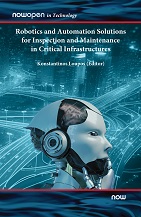Robotics and Automation Solutions for Inspection and Maintenance in Critical Infrastructures

Edited by Konstantinos Loupos, INLECOM INNOVATION, Greece, konstantinos.loupos@inlecomsystems.com
Publication Date: 08 Feb 2024
Suggested Citation: Konstantinos Loupos (ed.) (2024), "Robotics and Automation Solutions for Inspection and Maintenance in Critical Infrastructures", Boston-Delft: now publishers, http://dx.doi.org/10.1561/9781638282839
Downloaded: 45227 times
Description
Infrastructures are ageing and have become a subject of profound concern, awakening our collective consciousness to the imperatives of civil and structural integrity. This concern, compounded by the unrelenting impact of climate change and the burgeoning demand on transport networks and infrastructures, underscores the critical necessity of preserving infrastructural functionality, safety, and alignment with their original design objectives. In doing so, we strive to mitigate health, financial, societal, and environmental risks that these infrastructures may pose. Presently, the imperative is to maintain a vigilant and continuous watch over these critical assets, employing factual, real-time data to support efficient maintenance strategies.
This book embarks on a comprehensive exploration of the contemporary industrial challenges surrounding critical infrastructure inspection and maintenance. It offers a detailed examination of current inspection methodologies, manual intervention practices, and the intricate challenges involved in the sustained, systematic evaluation of structural integrity. Subsequently, it delivers an exhaustive analysis and technical elucidation of recent research breakthroughs across various infrastructures and industrial domains. These innovations, deeply rooted in robotics, automation, and digital technologies, augment, support, streamline, and often redefine established paradigms in the realms of inspection and maintenance. Among these innovations are the outcomes of research endeavours co-funded by the European Commission, addressing a spectrum of research priorities and thematic areas.
The solutions delineated in this book encompass an array of cutting-edge technologies, from robotic ground vehicles to unmanned aerial systems, digital platforms, advanced sensing solutions, and state-of-the-art visualization and 3D imaging technologies. These technologies foster enhanced data acquisition, precise reporting, and ultimately, more efficient inspection and maintenance approaches. As we navigate through the years ahead, the inevitability of ageing infrastructures looms large, while the tangible value of modern technologies is already manifesting in numerous industrial applications. Though the journey may be arduous, the assimilation of digital technologies into existing infrastructure inspection and maintenance frameworks is gaining traction and acceptance, aligning with the overarching vision articulated within this book.
-
ISBN: 978-1-63828-283-9
324 pp. Open Access (.pdf) This is published under the terms of CC BY-NC
